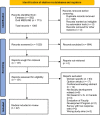Faculty Development in Academic Hospital Medicine: a Scoping Review
- PMID: 36877213
- PMCID: PMC10271943
- DOI: 10.1007/s11606-023-08089-4
Faculty Development in Academic Hospital Medicine: a Scoping Review
Abstract
This scoping review sought to identify and describe the state of academic faculty development programs in hospital medicine and other specialties. We reviewed faculty development content, structure, metrics of success including facilitators, barriers, and sustainability to create a framework and inform hospital medicine leadership and faculty development initiatives. We completed a systematic search of peer-reviewed literature and searched Ovid MEDLINE ALL (1946 to June 17, 2021) and Embase (via Elsevier, 1947 to June 17, 2021). Twenty-two studies were included in the final review, with wide heterogeneity in program design, program description, outcomes, and study design. Program design included a combination of didactics, workshops, and community or networking events; half of the studies included mentorship or coaching for faculty. Thirteen studies included program description and institutional experience without reported outcomes while eight studies included quantitative analysis and mixed methods results. Barriers to program success included limited time and support for faculty attendance, conflicting clinical commitments, and lack of mentor availability. Facilitators included allotted funding and time for faculty participation, formal mentoring and coaching opportunities, and a structured curriculum with focused skill development supporting faculty priorities. We identified heterogeneous historical studies addressing faculty development across highly variable program design, intervention, faculty targeted, and outcomes assessed. Common themes emerged, including the need for program structure and support, aligning areas of skill development with faculty values, and longitudinal mentoring/coaching. Programs require dedicated program leadership, support for faculty time and participation, curricula focused on skills development, and mentoring and sponsorship.
© 2023. The Author(s), under exclusive licence to Society of General Internal Medicine.
Conflict of interest statement
The authors declare that they do not have a conflict of interest.
Similar articles
-
A Facilitated Peer Mentoring Program With a Dedicated Curriculum to Foster Career Advancement of Academic Hospitalists.MedEdPORTAL. 2023 Dec 8;19:11366. doi: 10.15766/mep_2374-8265.11366. eCollection 2023. MedEdPORTAL. 2023. PMID: 38076293 Free PMC article.
-
Independent investigator incubator (I3): a comprehensive mentorship program to jumpstart productive research careers for junior faculty.BMC Med Educ. 2018 Aug 6;18(1):186. doi: 10.1186/s12909-018-1290-3. BMC Med Educ. 2018. PMID: 30081899 Free PMC article.
-
Identifying Components of Success Within Health Sciences-Focused Mentoring Programs Through a Review of the Literature.Am J Pharm Educ. 2019 Feb;83(1):6976. doi: 10.5688/ajpe6976. Am J Pharm Educ. 2019. PMID: 30894774 Free PMC article.
-
A Scoping Review of Health Care Faculty Mentorship Programs in Academia: Implications for Program Design, Implementation, and Outcome Evaluation.J Contin Educ Health Prof. 2023 Jan 1;43(1):42-51. doi: 10.1097/CEH.0000000000000459. Epub 2022 Oct 5. J Contin Educ Health Prof. 2023. PMID: 36215162
-
A scoping review of peer mentoring in medicine.Clin Teach. 2022 Oct;19(5):e13512. doi: 10.1111/tct.13512. Epub 2022 Jun 25. Clin Teach. 2022. PMID: 35751456
Cited by
-
Codifying educational leadership in modern hospital medicine: The Director of Education.J Hosp Med. 2025 Feb;20(2):195-199. doi: 10.1002/jhm.13433. Epub 2024 Jun 14. J Hosp Med. 2025. PMID: 38873769 Free PMC article.
-
Faculty development for undergraduate student programmatic assessment: a Brazilian multi-centered longitudinal study.BMC Med Educ. 2025 May 23;25(1):759. doi: 10.1186/s12909-025-07337-x. BMC Med Educ. 2025. PMID: 40410810 Free PMC article.
-
Short-Term Impact of Faculty Mentor Development on Mentees' Scholarly Productivity.Chron Mentor Coach. 2024 Oct;8(3):755-761. Chron Mentor Coach. 2024. PMID: 39726438 Free PMC article.
-
Faculty standardized patients versus traditional teaching method to improve clinical competence among traditional Chinese medicine students: a prospective randomized controlled trial.BMC Med Educ. 2024 Jul 24;24(1):793. doi: 10.1186/s12909-024-05779-3. BMC Med Educ. 2024. PMID: 39049066 Free PMC article. Clinical Trial.
-
Perceptions in Mentorship: The Mentor-Mentee Competency Discrepancy.Chron Mentor Coach. 2024 Jun;8(1):178-192. doi: 10.62935/eu1891. Chron Mentor Coach. 2024. PMID: 39355170 Free PMC article.
References
-
- Sheets KJ, Schwenk TL. Faculty development for family medicine educators: An agenda for future activities. Teaching and Learning in Medicine. 1990/01/01 1990;2(3):141-148. 10.1080/10401339009539447


